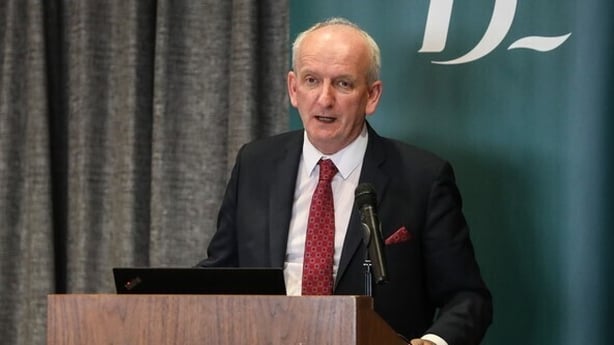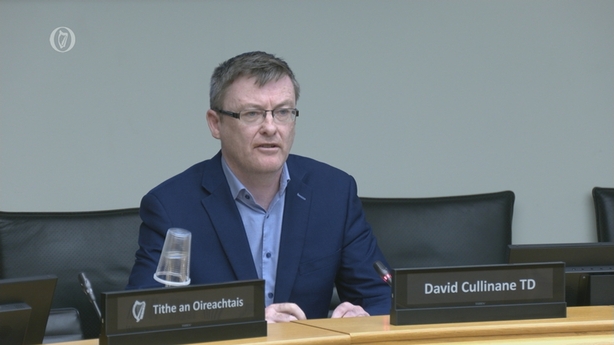The Health Service Executive has warned in its National Service Plan that it will require extra funding this year and it has outlined plans to cut spending on agency staff.
The HSE has been allocated a budget of €23.5 billion for 2024, which represents an increase of 4.6% on last year's funding.
The plan, published today, sets out the priorities for the provision of health and social care services in the year ahead.
It notes that since the start of 2020, staffing levels have increased by 20%, which it said "is the equivalent of around 24,000 extra full-time staff, with about 7,000 of these extra staff arriving in 2023".
However, the Chairperson of the HSE Board said "despite this welcome investment," the cost of running the existing services at current levels over the next 12 months "will be a significant challenge" and "likely to exceed the 2024 funding allocation".
Ciarán Devane said it means the HSE "will likely require supplementary funding support" during the year in the context of demand for care continuing to rise.
Despite the warning the HSE said there are no plans to reduce services being provided.
Mr Devane said: "it is not intended to cut services in 2024, so in financial management terms we will seek to minimise any deficit that might arise should financial risks materialise."
As part of the efforts to address health spending, the HSE has set a target to reduce the hours of agency staff use by around a third.
The move would equate to savings of €250 million this year.
It said the move will require an increase in productivity, through increasing the efficiency and effectiveness of services, in order to maintain current service levels.
The plan also aims to reduce the reliance on agency workers for overtime by €80 million this year, through the conversion of such staff to full-time employees.
In the NSP, the HSE said: "this level of reduction in agency staffing hours is the equivalent of 3,000 - 4,000 full time staff and will be a challenge for services."
"It needs, however, to be looked at in the context of the over 24,000 more directly employed staff that are working in our health services today, compared to the start of 2020," it added.

Speaking on RTÉ's Six One News, HSE Chief Executive Bernard Gloster said that he "only expects to see an increase in agency staff where we're losing staff".
Mr Gloster also said the plan will not result in staff having to work more in order to make up for the cut of up to one third of agency staff.
He said: "The reduction in agency staff has to be seen in the context of the total use of staff.
"In the HSE in 2023 we overran the available budget for agency and overtime staff by approximately a half to two thirds.
"Last year we intended to increase our workforce by a net 6,100. We increased it by 8,300.
"All of those additional staff added to the ways of working that we're constantly refining.
"I would only ever expect to see an increase for agency staff where we’re losing staff."
The Chief Executive of the HSE said it was important to state that "these controls do not mean there will be no recruitment in 2024."
Mr Gloster said more than 2,200 additional staff are provided for in 2024, however, he said "it is fair to say that 2024 will be a year of consolidation, smaller growth and better control."
In the service plan, the HSE said: "The reduction in agency staff hours means that we will need to increase productivity and safely see, assess, treat and care for more people with the same or less staff, without reducing service quality or overburdening our staff."
A report into health spending in Ireland from the Parliamentary Budget Office, published last August, showed a substantial increase in the cost of hiring staff through agencies.
The amount of money spent on agency workers increased by 139% during the period between 2015 and 2022, from €259 million to €619 million.
The HSE said the focus for 2024 is on improving access to urgent and emergency care, prioritising waiting lists and continuing to enhance mental health and disability services.
It also said: "addressing deficits in services provided in Children's Disability Network Teams (CDNTs) is critical for the HSE and its partners in 2024, recognising the significant positive impact that early intervention can have for children and their families."
The 100-page NSP also commits to "a targeted strategic focus on recruitment and retention of the workforce for disability services".

Mr Gloster said the budget for 2024 and the increases in funding over recent years "represent a significant investment by the State, which has resulted in many improved outcomes for the people we care for".
He said the investment in the services "is welcomed and has allowed the HSE to respond to sustained pressures, but not yet to overcome all of them."
"In 2023, we improved access in both scheduled and unscheduled care but with, many challenges remaining, these must be our priorities again in 2024."
Mr Gloster said: "Medical inflation remains high, and this is compounded by a significant acceleration in the cost of delivering healthcare, notably energy and staffing cost."
Sinn Féin's spokesperson on health David Cullinane described the plan, which he said was approved by the Government, as "a work of fiction" and built on an insufficient budget.
Mr Cullinane said: "It's very clear and very obvious that the HSE has not been given enough money to fund the health services for 2024."
He said the HSE has not been given enough money "even for services to standstill, never mind new initiatives and new measures to put beds into the system that we need, to recruit staff and to build up the capacity that's necessary".
"We already had the head of the HSE last year, saying that the health service would not be properly funded for 2024. That's a reality," he said.
Mr Cullinane said that position has now been echoed by the chair of the HSE in the service plan.
He said: "Essentially, the Government is producing a national service plan, that's a work of fiction, where the health service is not properly funded, even to a standstill, and very little money for new measures."
Mr Cullinane said he believes "there is absolutely no doubt that will be a requirement for a very significant supplementary budget in health for 2024."
He accused the Government of making "a very conscious decision not to properly fund" the HSE in 2024.







